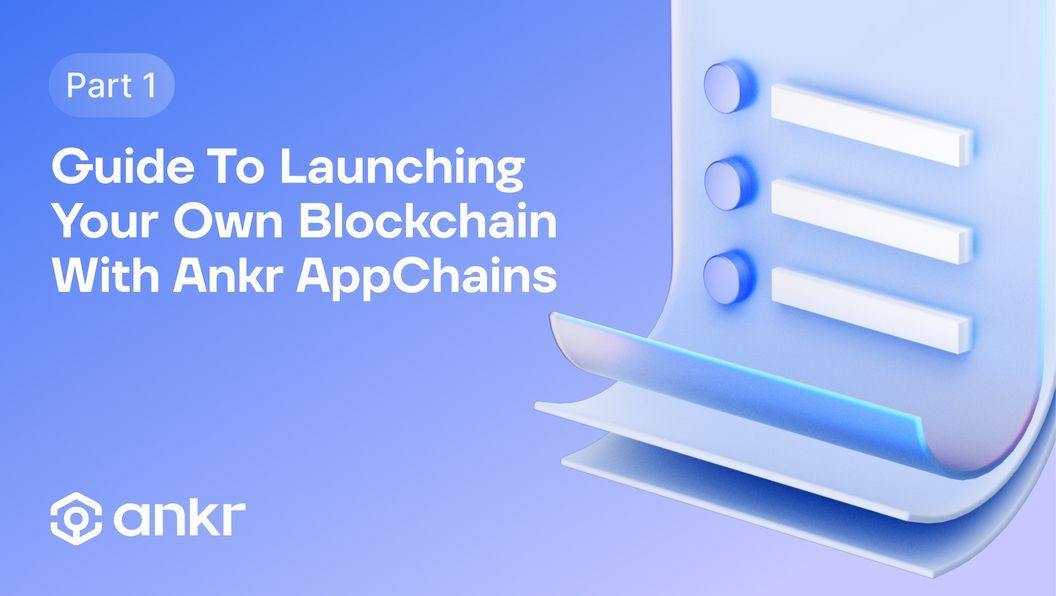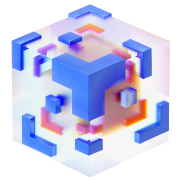Part 1: Guide To Launching Your Own Blockchain With AppChains

Kevin Dwyer
March 7, 2023
6 min read

Ankr AppChains allows any Web3 application or project team to create their own dedicated blockchain as a sidechain in ecosystems like Polygon, BNB Application Sidechains, or Avalanche. Ankr AppChains is designed to provide an incredibly scalable environment for enterprises of all sizes.
The AppChains experience is designed to provide an experience that is as easy and seamless as possible for any enterprise:
- Established Web3 Apps: Applications already deployed to public blockchains like Ethereum or the BNB Smart Chain can easily transition to their own dedicated AppChain to scale. With tools like the BridgeHub from AppChains, token supplies and other assets can be easily migrated to the new chain.
- New Web3 Projects: Building a blockchain and community from scratch is easy with Ankr’s team to help you along every step of the way with consulting and tools like our Exchange Readiness Program to help get your token listed on major exchanges.
- Traditional Enterprises: Companies looking to explore the blockchain vertical in NFTs, gaming, and other use cases will find the AppChains team offers advice on every item they may not be familiar with. Telling Ankr everything the app needs to do will be enough to implement custom features as they create your network, tokens, and infrastructure.
This is the first in a three-part series that will guide you through exactly what you can expect in the AppChain creation process. Below are the first three steps on the path to launching your very own blockchain to power your dApp.
Choose Custom Infrastructure With the AppChain Configurator
When building a blockchain, the first step is to determine the custom infrastructure needs of your project. The infrastructure requirements of a blockchain can vary significantly based on the specific use case. Whether you are a new project or an existing project migrating from a public blockchain, AppChains will provide a seamless onboarding experience.
- Head to Ankr’s AppChain Configurator
- Follow the prompts and choose your specifications
- Submit your request and schedule an appointment with Ankr’s team
Choose from specifications like:
-
Mother chain: Choose between building your AppChain on mother chains like BNB Application Sidechains or Polygon Supernets with a breakdown of the TPS and validator capital requirements that best suite your project.
-
Bridging: Including bridge capabilities means your project will be inducted into BridgeHub (the official bridging solution of AppChains) to enable easy cross-chain transactions with outside networks such as Ethereum or Polygon, increasing interoperability and ease-of-use for your AppChain.
-
Gaming SDK: Perfect for Web3 gaming use cases, the Gaming SDK can give any game full Web3 wallet, crypto, and blockchain capabilities. As it now works with games built with Unity or Unreal engines, it is a powerful tool to migrate both mobile and traditional video games to Web3.
-
Silent Signing SDK: This SDK will enable automated transactions within your application to simplify the Web3 experience for your users. Silent Signing is a great addition to apps with a large base of users who may not be well versed in crypto and Web3 operations such as gamers.
-
Advanced APIs: These specially-designed blockchain APIs will give your dApp faster blockchain interactions using pre-indexed data. Perfect for virtual worlds, games, galleries, marketplaces, and much more, the Advanced APIs will offer a faster, better UX.
-
NFT Marketplace: Ankr can create a marketplace for your app that lets users easily mint, trade, and collect NFTs through your custom interface. This is perfect for sports enterprises, entertainment companies, loyalty programs, and any other NFT project use cases.
-
Integrated Liquid Staking: Liquid staking is an advanced staking method that will give your native token stakers a new reward-bearing token in exchange that they can utilize on other DeFi platforms for earning strategies such as yield farming and vaults.
-
Token model: You will be able to choose tokenomics such as if your token will be inflationary or fixed. This can affect your token’s value over time and the choice will be highly dependent on its use case.
If you aren’t sure what to choose for any of the options in the configurator, don’t worry. The Ankr team will meet with you in the next step to answer any questions and provide expert guidance based on the unique needs of your decentralized application.
Meet With Ankr’s Team To Finalize Your AppChain Blueprint
Once the AppChain team receives your request, they will review your needs and join your scheduled meeting prepared with questions, answers, and guidance to get your project up and running in as little time as possible. This conversation will include features, timelines, cost estimations, and further information on the team’s next step – creating your testnet.
Ankr’s Engineering Team Designs & Delivers Your Testnet
The testnet is an essential component of your blockchain as it allows you to test your decentralized application and smart contracts before deploying them on the mainnet. With AppChains, your custom testnet will be created to closely mimic the mainnet environment to come, enabling you to test your application's functionality in unique scenarios.
-
Consensus Mechanism As the backbone of your blockchain, the consensus mechanism defines the procedures for how transactions are validated, recorded, and agreed upon as the state of the blockchain. With AppChains, you can choose from various consensus mechanisms, including Proof of Stake (PoS), Proof of Staked Authority (PoSA), or a custom implementation to enhance security.
-
RPC Node Infrastructure - RPC nodes or “full nodes” store a complete history of the blockchain’s data and provide an interface for external applications to interact with your blockchain. The AppChain team will ensure your RPC infrastructure will be robust, secure, and reliable, with easy RPC API access for development.
-
Validator Nodes - Validator nodes are responsible for validating transactions so they can be added to new blocks in your AppChain. With AppChains, you can select the number of validator nodes you’ll need to propagate your network and ensure sufficient decentralization.
-
Tokenomics - Your tokenomics scheme is the economic structure of your blockchain, including the total token supply, distribution, gas fee system, and inflation rate. With AppChains, you have complete control over tokenomics and transaction fees, allowing you to customize experiences to suit your incoming app users.
-
Staking System - Staking allows token holders to help secure the validation process of your blockchain and earn rewards for doing so. With AppChains, you can create a custom staking system that suits your specific use case, while setting the staking rewards and requirements.
-
Block Explorer - A block explorer is an essential component of any blockchain, allowing users to view transactions and blocks on the blockchain. With AppChains, you can customize your block explorer, including adding custom features and branding.
Final Thoughts
Creating a custom blockchain can be a daunting task, but with AppChains, the process has become easier than ever before. In this first part of our three-part blog series, we have explored the initial step in the process, which is selecting the custom infrastructure needs of your blockchain. With AppChains, you have complete control over your blockchain's infrastructure, allowing you to create a custom blockchain that suits your specific use case. In the next part of this series, we will explore the next step in the process, which is launching the mainnet and implementing any additional infrastructure and tooling that your application may need.
Join the Conversation on Ankr’s Channels!
Twitter | Telegram Announcements | Telegram English Chat | Help Desk | Discord | YouTube | LinkedIn | Instagram | Ankr Staking





